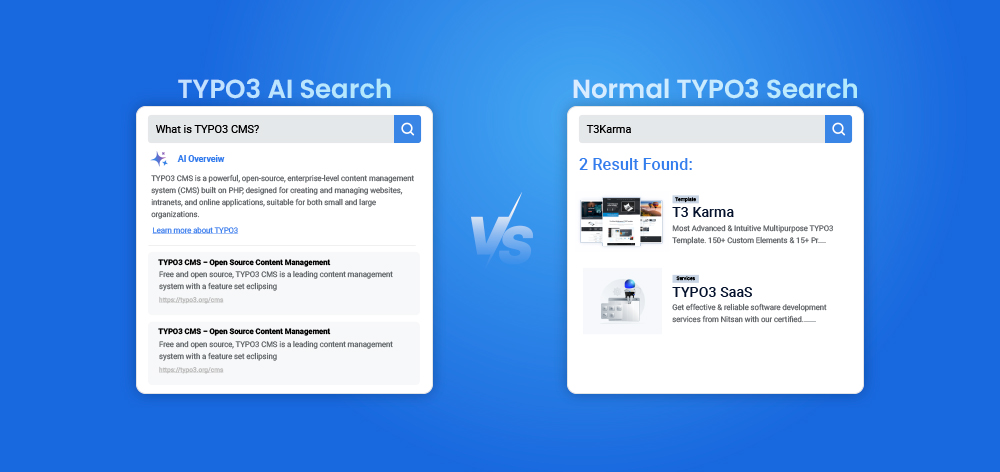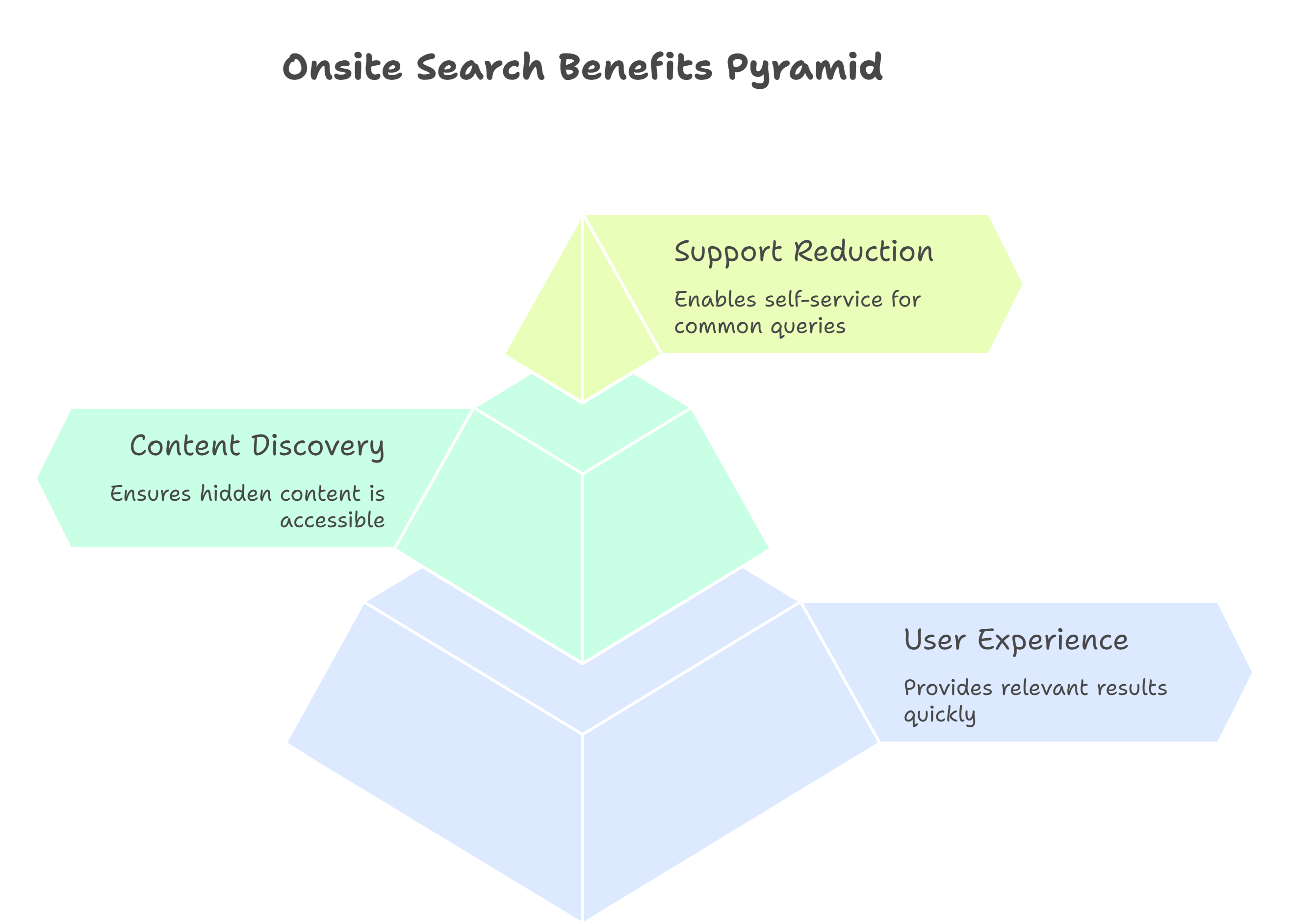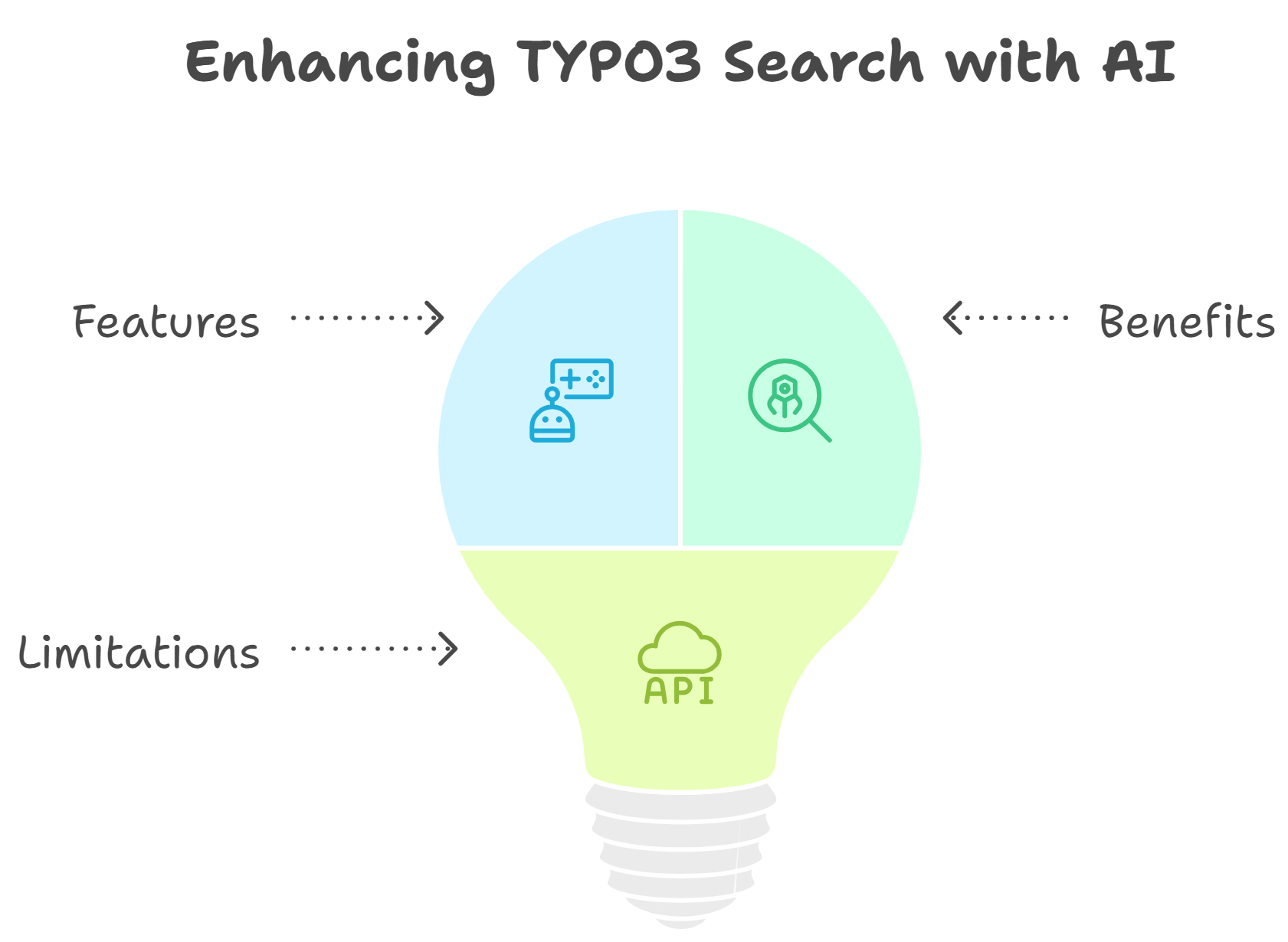Onsite search plays a crucial role in the usability and overall success of TYPO3 websites. A fast, accurate, and intuitive search function helps visitors quickly find the content they need, improving engagement, reducing frustration, and increasing conversions.
For content-heavy sites or portals, a well-designed search system is not just a convenience; it’s a necessity for effective navigation and content discovery.
Why Onsite Search Matters for TYPO3 Websites
TYPO3 websites usually have complex structures, multiple content types, and are multilingual. Visitors can have a hard time finding the information without a strong search function, which can result in higher bounce rates and lower user satisfaction. Effective onsite search:
- Increases user experience by offering relevant results without delay.
- Boosts content visibility, making sure that even hidden or deeply nested content can be reached.
- Decreases the number of support requests since the users can find answers to their questions on their own.
Existing Search Solutions in TYPO3 - Overview
The range of search options in TYPO3 includes different levels of complexity, the basic one being a keyword-based search, while the other is advanced extensions.
- Indexed_search: The core search module of TYPO3 for the basic lookup of content.
- ke_search: An adaptable extension that features user-modifiable indexing and search filters.
- Solr Integration: The most advanced search with precise ranking, facets, and multi-site support technology is used for the enterprise-level search.
Though these tools are quite efficient, traditional searches mostly depend on exact keywords. This can give irrelevant results or situations where no results are found. In fact, today's users want more: they want a search that can understand the intent, process natural language queries, and provide accurate answers.
Moving from a Basic Keyword Search to AI-Driven Options
The onsite search has also benefited from AI breakthroughs in recent years to the point that AI-driven search systems like T3AS can now:
- Instead of merely matching keywords, they understand natural language questions.
- With traditional search results, they provide direct answers as well.
- Based on the visitor’s intent and context, they make the results personalized.
Thanks to AI-powered search, TYPO3 websites can now make every visit smoother and more satisfying by delivering faster, more relevant results.
TYPO3 Indexed_search
Indexed_search is the typical search extension residing in the TYPO3 core. The tool directly interacting with TYPO3 pages and content elements, hence, a minimal but working search instrument.
Features:
- Dexes pages and content elements of TYPO3 to get data.
- This tool is included in the TYPO3 core, so no additional installation is required.
- Essential keyword search for users to locate content.
Benefits:
- Easy setup: No complicated configuration is required.
- Free of charge: Already included in the TYPO3 core.
- Dependable for small sites: Fits nicely to websites with basic content structures.
Limitations:
Keyword-only search: It does not grasp query semantics.
- Limited configuration: There are only a few settings for the search results and ranking.
- Absence of semantic faculties: Cannot process input in natural language or generate an answer directly.
- Rough user-experience: They might receive irrelevant results or “no results found” if the keywords happen to be different.
Indexed_search is a good choice for small websites or simple search needs. In the case of large or content-heavy TYPO3 sites, the usage of more advanced solutions like ke_search or AI-driven search is recommended.
Ke_search
ke_search is a TYPO3 search extension that is more powerful than the Indexed_search
It is perfect for websites with complex content and structure and can manage content of medium size projects.
Features:
- Indexing of several content sources such as pages, news, and custom records.
- Enable faceted search that provides filters for categories, tags, and other content types.
- Supports the configurable options for sorting and showing results.
Benefits:
- Flexible and extensible: The function can be adapted to the particular requirements of your TYPO3 site.
- Good user experience: Filters and facets enable the visitor to find a more accurate list of results.
- Suitable for medium-size projects: The tool is very effective for medium-sized websites with more content and various content types.
Limitations:
- Still completely keyword-based: The only thing that Ke_search can do is matching the user queries with the content without trying to understand the meaning.
- No AI features: Cannot generate a response or interpret normal language.
- Need for frequent re-indexing: The update of content need to be done regularly to keep the latest content.
Installation may be difficult: More settings will be required than in the case of Indexed_search.
While ke_search may be a great tool for enhancing navigation and search flexibility, it still heavily depends on keywords. Users that type natural questions or expect AI answering should rather use an extension like T3AS which is a lot smarter and faster.
Apache Solr for TYPO3
Apache Solr is a highly sophisticated search solution that is part of the TYPO3 ecosystem.
It is designed to support large, intricate websites and is the go-to product for companies looking for the best of both worlds: robust indexing and advanced search capabilities for sites with a lot of traffic or content.
Features:
- Comprehensive indexing of TYPO3 pages, content elements, and custom records.
- Support for languages is built-in natively allowing a website to be in any number of languages.
- Advanced filtering, faceted search, and sorting options are available to users.
- High scalability to the large extent of websites.
Benefits:
- Capability of large websites: Is the one to do it in a way that hardly affects performance and can handle up to millions of records with ease.
- Queries that reflect the capability: Provides fast search results even for complicated searches.
- Advanced user experience: Facilitates the use of facets, filters, and custom ranking, which makes the selection of results to be more accurate.
- Flexible integration: Is suitable for enterprise portals with a heavy traffic load or for TYPO3 websites with high demand.
Limitations:
- High requirements for the establishment of a system: The proper setting of the server and the resources needed to run it.
- Technical skills are required: The procedure of installation, maintaining, and troubleshooting demand the presence of a developer or technician with the necessary technical know-how.
- Hosting fee: It is more expensive because of the infrastructure and resource necessity.
Apache Solr is a perfect match for enterprise TYPO3 websites requiring speed, scalability, and advanced search features as part of the critical operations. Though, for smaller websites or less complicated search needs, Indexed_search or ke_search would be a better fit.
T3AS – TYPO3 AI Search
T3AS represents AI-based search, which is an add-on for the existing search system of TYPO3.
It is based on the existing search, such as Sitecontent, Solr, ke_search, and Indexed_search.
T3AS is an intelligent add-on to an already AI-based search to provide a faster, more precise, and human-like result.
Features:
- AI-driven semantic search: It not only looks for keywords but also for user intent.
- Retrieval-Augmented Generation (RAG): It makes use of the actual content of the site to come up with the correct answer and is GDPR friendly.
- Flexible integration: Can function with or without Solr, ke_search, or Indexed_search.
- Dynamic UI options: Can be a chat widget, inline answers, or a floating search bubble.
- Backend control: You can choose AI models, answer types, indexing schedules, and updates.
- Scalable: Can be used for a small website as well as a big one.
Benefits:
- Faster and precise results: Visitors get the right answers quickly.
- Natural question answering: Users can type questions in their own words.
- Reduced support workload: AI handles routine queries automatically.
- Improved visitor satisfaction: More engaging search experience, longer time on site.
- Easy to manage: It requires very little setup and maintenance as compared to traditional search solutions.
Limitations:
- Requires AI setup: It is needed to be initially set up, and its implementation should be done along with the content of the site.
- Server considerations: Depending on the site size, the AI models may consume additional server resources.
- Learning curve: TYPO3 administrators might require basic knowledge of AI integrations and model management.
T3AS is able to give advanced search results to TYPO3 users.
Unlike conventional keyword-based search systems, it can infer the intent, deliver straightforward answers, and raise the overall site engagement level.
Comparative Overview of TYPO3 Search Solutions
| Feature | Indexed_search | ke_search | Solr | T3AS |
| Setup complexity | Low | Medium | High | Medium |
| Search method | Keywords | Keywords | Keywords | AI + Keywords |
| Scalability | Small sites | Small/Medium | Enterprise | All sizes |
| Semantic understanding | No | No | No | Yes |
| Integration effort | Built-in | Extension | External server | Plug-and-play |
| Custom UI options | Minimal | Yes | Yes | Yes (chat, inline, floating) |
Choosing the Right TYPO3 Search Solution
Selecting a search solution that fits your website size, content complexity, and what visitors expect from the search experience will help you make the right decision:
- Indexed_search: The most suitable option for small or basic websites that have only simple keyword-based search requirements.
- ke_search: This is the right choice for medium-sized projects that require faceted search, filters, and more customizable features.
- Solr: The best option for very large and complicated websites with heavy traffic, a lot of content, or multiple languages.
- T3AS: The most suitable for websites that require AI-powered semantic search, NLU, and an easily scalable integration for any TYPO3 project.
When you pick the solution that fits your site's needs, you are able to improve the user experience, make your content more accessible, and save time that you would otherwise spend on support or repetitive queries.
Conclusion
TYPO3 provides a range of search solutions, each suited to different website sizes and requirements. From the basic Indexed_search to enterprise-level Solr, every option has its strengths.
T3AS takes TYPO3 search to the next level by integrating AI, delivering more accurate results, understanding natural language queries, and enhancing overall user experience.
When choosing a search solution, consider your project’s size, content complexity, and future growth. Picking the right tool ensures faster content discovery, happier visitors, and reduced support workload.
FAQs
Indexed_search is basic and keyword-based, ke_search adds filters and faceted search, Solr is enterprise-level with advanced features, and T3AS adds AI-powered semantic search for natural language queries.
Yes. T3AS integrates seamlessly with Indexed_search, ke_search, Solr, or even native site content search.
Basic TYPO3 admin skills are enough for installation and configuration. Advanced options, like custom AI models, may require some technical setup.
Yes. T3AS can understand queries in multiple languages and delivers relevant results using AI-driven semantic search.
T3AS is scalable and works for both small sites and large enterprise portals, adapting to your site size and content volume.
AI understands the intent behind queries, provides direct answers, and reduces “no results found” issues, improving accuracy, speed, and user satisfaction.







Jürgen Pietschmann
TYPO3 AI ConsultantJürgen is a TYPO3 AI Consultant at AI Universe. He helps businesses make the most of their TYPO3 websites by integrating AI-powered solutions. From smart content creation and automated SEO improvements to seamless chatbot…
More From Author